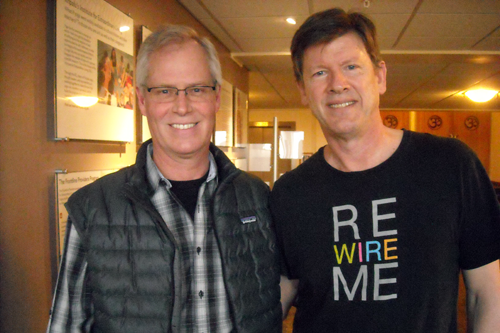
Against the serene backdrop of the Berkshire Mountains and glistening Lake Mahkeenac in Stockbridge, Massachusetts, I recently attended a three-day workshop on mindful self-compassion at the Kripalu yoga retreat center. I was there to learn how to tame my inner critic, under the tutelage of one of the foremost experts on the topic: Christopher Germer, Ph.D., author of The Mindful Path to Self-Compassion: Freeing Yourself from Destructive Thoughts and Emotions (Guilford Press), international workshop leader and trainer, and clinical instructor of psychology at Harvard Medical School. He was assisted by Brenda Rogers, a meditation and mindfulness teacher in the Boston area.
“We are hard-wired for survival and soft-wired for happiness,” noted Dr. Germer. As a result, we tend to focus more on negative experiences because they’re more important to self-protection. And the older we get, the more ingrained our self-criticism often becomes.
Dr. Germer’s dry wit and amusing anecdotes lightened the often deeply moving atmosphere of the workshop, which featured a varied mix of meditative exercises, short videos, question-and-answer sessions, and even poetry readings. I learned that self-compassion has been shown to reduce anxiety, depression, stress, and other aspects of well-being. I also found out that having more compassion for ourselves makes us more compassionate toward others. Especially interesting was the finding that veterans of intense battles who had high levels of self-compassion were less likely to suffer from PTSD than those low in self-compassion who had seen less intense action on the battlefield.
“We are hard-wired for survival and soft-wired for happiness,” noted Dr. Germer. As a result, we tend to focus more on negative experiences because they’re more important to self-protection. And the older we get, the more ingrained our self-criticism often becomes. In a way, self-compassion is a return to childhood; when young kids experience suffering, they don’t tend to blame themselves or ruminate about it, as adults do.
I realized I had thought of self-compassion as self-pity, even narcissism. But I was learning that it is neither of those, nor is it self-esteem. Rather, it is a nonjudgmental response to suffering that helps you determine what you really need and then meet that need with the right kind of soothing.
As the discussions continued, I realized I had thought of self-compassion as self-pity, even narcissism. But I was learning that it is neither of those, nor is it self-esteem. Rather, it is a nonjudgmental response to suffering that helps you determine what you really need and then meet that need with the right kind of soothing.
Experiencing a difficult emotion? Here’s a three-step process for managing it:
- Name it. Describing the type of emotion you’re feeling gives you something you can deal with directly: “Name it and you can tame it.”
- Locate it. Different people feel stress in different parts of the body as they brace themselves in the face of intense emotion. (I usually tense up my shoulders; others feel it in the gut or forehead.) Finding this location is an important step in relieving the tension.
- Soothe it. You can deliver compassion to yourself by placing a hand on your heart, face, or shoulders during formal meditation or at stressful moments in your day. Offering compassionate words to yourself can also be very powerful.
Forging a Deep Relationship in 15 Minutes
While we were offered a bounty of valuable exercises over the weekend, I was deeply affected by two of them. One was a meditation in which we paired up with another participant to revisit moments from our lives. My partner was Alexandra, a young woman who had made several insightful comments during the sessions. In this simple yet powerful routine, Alexandra closed her eyes and followed a guided meditation, remembering happy events from her childhood while I watched her face and imagined scenes from her life. We then looked into each other’s eyes for about two minutes and then reversed roles and locked eyes again. The process was repeated as we contemplated difficult events in our lives.

This exercise can be useful during a difficult encounter. Visualize a message of love or peace coming into you as you inhale, then the same feeling going out to the other person as you exhale. This simple process helps provide a sense of connection with that person and can be very soothing. And it helps you give yourself kindness when you need it most.
By the end of this exercise, which moved many participants to tears, I was astonished by how close I felt to Alexandra, a total stranger. It gave me a powerful sense of connection with humanity itself, which is a key way station en route to self-compassion—the recognition that suffering and happiness are universal. It gave us both a strong feeling of continuity spanning our lives. When we were asked to think of a photograph of ourselves, Alexandra said, “You realize that all the joys and sorrows of your whole life are in this moment.”
In another powerful exercise, we envisioned ourselves in a safe place where a special visitor arrived to offer compassion. My choice was a tiny island in a lake in Maine where I had vacationed many times. I saw my mother arriving out of the mist in a boat being rowed by my father. As my mother and I shared a cup of tea in my reverie, I became a child again, following her around the backyard of my boyhood home. It was as if I had returned to a time when I could reclaim the self-compassion I had lost. (You’ll find free guided meditation exercises on Dr. Germer’s website.)
“Behind hard feeling are soft feelings,” said Dr. Germer. “And behind soft feelings are unmet needs.” For example, if you’re boiling mad, behind that feeling might be a sense of rejection or abandonment by a friend or lover, and behind those feelings lies the need to be respected and loved. Thanks to the guidance of Christopher Germer and Brenda Rogers, I’m better prepared to recognize my unmet needs during dark moments…and respond to them with kindness.
Related Reading
- The Power of Self-Compassion
- Richard Davidson: Advancing the State of Mindfulness
- Toward a Science of Wisdom and Compassion
Post Disclaimer
This content is for informational purposes only and does not constitute medical advice. Please consult a healthcare professional for any medical concerns.



